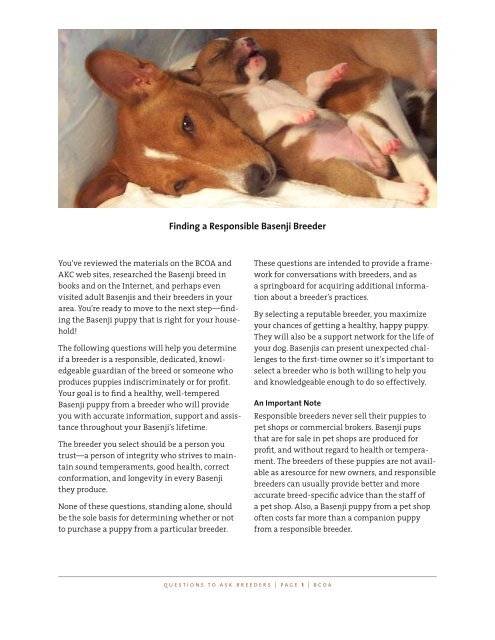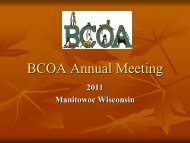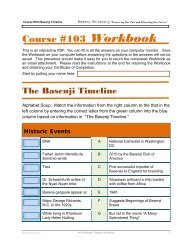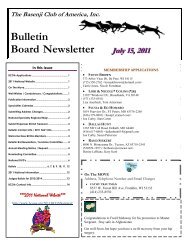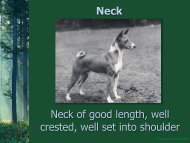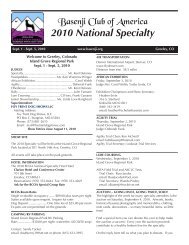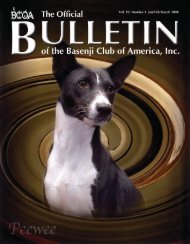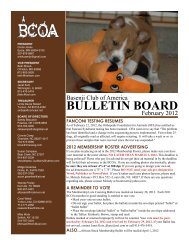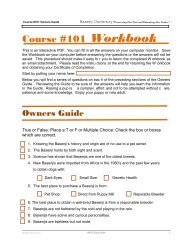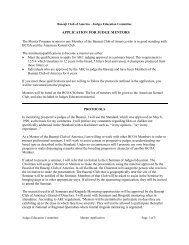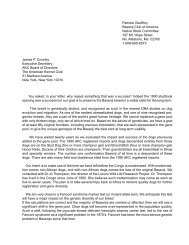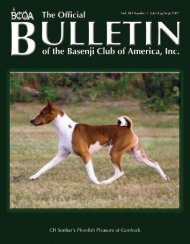Finding a Responsible Basenji Breeder - the Basenji Club of America
Finding a Responsible Basenji Breeder - the Basenji Club of America
Finding a Responsible Basenji Breeder - the Basenji Club of America
Create successful ePaper yourself
Turn your PDF publications into a flip-book with our unique Google optimized e-Paper software.
<strong>Finding</strong> a <strong>Responsible</strong> <strong>Basenji</strong> <strong>Breeder</strong><br />
You’ve reviewed <strong>the</strong> materials on <strong>the</strong> BCOA and<br />
AKC web sites, researched <strong>the</strong> <strong>Basenji</strong> breed in<br />
books and on <strong>the</strong> Internet, and perhaps even<br />
visited adult <strong>Basenji</strong>s and <strong>the</strong>ir breeders in your<br />
area. You’re ready to move to <strong>the</strong> next step—finding<br />
<strong>the</strong> <strong>Basenji</strong> puppy that is right for your household!<br />
The following questions will help you determine<br />
if a breeder is a responsible, dedicated, knowledgeable<br />
guardian <strong>of</strong> <strong>the</strong> breed or someone who<br />
produces puppies indiscriminately or for pr<strong>of</strong>it.<br />
Your goal is to find a healthy, well-tempered<br />
<strong>Basenji</strong> puppy from a breeder who will provide<br />
you with accurate information, support and assistance<br />
throughout your <strong>Basenji</strong>’s lifetime.<br />
The breeder you select should be a person you<br />
trust—a person <strong>of</strong> integrity who strives to maintain<br />
sound temperaments, good health, correct<br />
conformation, and longevity in every <strong>Basenji</strong><br />
<strong>the</strong>y produce.<br />
None <strong>of</strong> <strong>the</strong>se questions, standing alone, should<br />
be <strong>the</strong> sole basis for determining whe<strong>the</strong>r or not<br />
to purchase a puppy from a particular breeder.<br />
These questions are intended to provide a framework<br />
for conversations with breeders, and as<br />
a springboard for acquiring additional information<br />
about a breeder’s practices.<br />
By selecting a reputable breeder, you maximize<br />
your chances <strong>of</strong> getting a healthy, happy puppy.<br />
They will also be a support network for <strong>the</strong> life <strong>of</strong><br />
your dog. <strong>Basenji</strong>s can present unexpected challenges<br />
to <strong>the</strong> first-time owner so it’s important to<br />
select a breeder who is both willing to help you<br />
and knowledgeable enough to do so effectively.<br />
An Important Note<br />
<strong>Responsible</strong> breeders never sell <strong>the</strong>ir puppies to<br />
pet shops or commercial brokers. <strong>Basenji</strong> pups<br />
that are for sale in pet shops are produced for<br />
pr<strong>of</strong>it, and without regard to health or temperament.<br />
The breeders <strong>of</strong> <strong>the</strong>se puppies are not available<br />
as aresource for new owners, and responsible<br />
breeders can usually provide better and more<br />
accurate breed-specific advice than <strong>the</strong> staff <strong>of</strong><br />
a pet shop. Also, a <strong>Basenji</strong> puppy from a pet shop<br />
<strong>of</strong>ten costs far more than a companion puppy<br />
from a responsible breeder.<br />
q u e s t i o n s t o a s k b r e e d e r s | p a g e 1 | b c o a
1 How long have you been involved with<br />
<strong>Basenji</strong>s<br />
A person who begins to breed <strong>Basenji</strong>s immediately<br />
after acquiring <strong>the</strong>ir first dogs may not have<br />
<strong>the</strong> background knowledge to evaluate pedigrees<br />
for health and temperament issues, and may lack<br />
sufficient experience with <strong>the</strong> breed to provide<br />
accurate, on-going advice to puppy buyers.<br />
2 Do you belong any dog clubs, and if so why is it<br />
important to you<br />
Belonging to <strong>the</strong> AKC parent club, <strong>Basenji</strong> <strong>Club</strong> <strong>of</strong><br />
<strong>America</strong> (BCOA) or a regional <strong>Basenji</strong> club indicates<br />
that a breeder maintains some degree <strong>of</strong><br />
contact with o<strong>the</strong>r people who are committed to<br />
<strong>the</strong> breed. As members, <strong>the</strong>y receive publications<br />
that contain information about health testing,<br />
and o<strong>the</strong>r issues that impact <strong>the</strong> welfare <strong>of</strong> <strong>the</strong><br />
breed.<br />
3 Do you show your dogs in conformation or<br />
participate in o<strong>the</strong>r activities (lure coursing,<br />
agility, obedience) with your dog<br />
<strong>Breeder</strong>s who show or participate in performance<br />
events have many opportunities to compare<br />
<strong>Basenji</strong>s <strong>of</strong> <strong>the</strong>ir breeding with <strong>Basenji</strong>s bred<br />
by o<strong>the</strong>rs. They are more likely to be in <strong>the</strong> loop<br />
regarding important health information, and to<br />
be serious, life-long students <strong>of</strong> <strong>the</strong> breed.<br />
4 Do you health test <strong>the</strong> <strong>Basenji</strong>s you’re breeding<br />
<strong>Responsible</strong> breeders are aware <strong>of</strong> all health problems<br />
affecting <strong>Basenji</strong>s, and strive not to produce<br />
<strong>the</strong>se problems in <strong>the</strong>ir pups. They utilize <strong>the</strong> best<br />
health testing methods available to screen <strong>the</strong>ir<br />
breeding stock, and can provide evidence to back<br />
up <strong>the</strong>ir testing claims. Hip and eye results can<br />
be verified on <strong>the</strong> OFA web site, www. <strong>of</strong>fa.org,<br />
but a responsible breeder volunteers documented<br />
evidence <strong>of</strong> <strong>the</strong> health tests <strong>the</strong>y perform. Health<br />
testing on a routine basis can be expensive—<br />
some breeders who produce pups primarily for<br />
pr<strong>of</strong>it cut corners on health testing to save money.<br />
A breeder who is concerned about <strong>the</strong> long-term<br />
welfare <strong>of</strong> <strong>the</strong> breed will health test for <strong>the</strong> conditions<br />
mentioned on <strong>the</strong> BCOA Health page, and be<br />
especially concerned with <strong>the</strong> following before<br />
breeding:<br />
Hip dysplasia—dogs will have an OFA certification<br />
<strong>of</strong> fair, good or excellent)<br />
Inherited eye diseases—dogs will have CERF<br />
certification<br />
Fanconi Syndrome—monthly urine glucose<br />
testing is recommended<br />
Thyroid disease—thyroid blood panel to determine<br />
if thyroid function is low, or normal<br />
5 What health problems are behind <strong>the</strong> sire and<br />
dam <strong>of</strong> your litter What can you tell me about<br />
<strong>the</strong> siblings and o<strong>the</strong>r relatives<br />
Serious breeders talk openly about health issues<br />
<strong>the</strong>y’ve encountered in <strong>the</strong>ir years <strong>of</strong> breeding,<br />
and will be able to tell you how <strong>the</strong>y are working<br />
to avoid problems in <strong>the</strong> future.<br />
Two major health problems affecting <strong>Basenji</strong>s—<br />
Fanconi and PRA—occur later in life (after four<br />
years <strong>of</strong> age)—and even careful, knowledgeable<br />
breeders may encounter problems. At present,<br />
<strong>the</strong>re are no DNA marker tests for <strong>the</strong>se conditions.<br />
The best chance to avoid hereditary health<br />
problems like Fanconi and PRA is to purchase a<br />
puppy from a breeder who:<br />
– health tests <strong>the</strong> dogs <strong>the</strong>y are breeding for<br />
common <strong>Basenji</strong> ailments, and has a good<br />
working knowledge <strong>of</strong> <strong>the</strong> family health history<br />
behind <strong>the</strong>ir dogs (not just <strong>the</strong> sire and<br />
dam, but <strong>the</strong> grand sire, grand dam, and o<strong>the</strong>r<br />
relatives as well).<br />
q u e s t i o n s t o a s k b r e e d e r s | p a g e 2 | b c o a
6 When you select a sire or dam for a litter, do<br />
you consider <strong>Basenji</strong>s from o<strong>the</strong>r breeders, or<br />
<strong>Basenji</strong>s that do not reside with you<br />
<strong>Breeder</strong>s will occasionally breed a male <strong>Basenji</strong><br />
that resides with <strong>the</strong>m to a female that resides<br />
with <strong>the</strong>m. But if a breeder never selects mates<br />
o<strong>the</strong>r than those that reside in <strong>the</strong>ir household, it<br />
is possible that:<br />
– is trying to avoid paying stud fees<br />
– doesn’t understand <strong>the</strong> importance <strong>of</strong> selecting<br />
mates that are a good match genetically<br />
and physically<br />
– <strong>the</strong> breeder is not well-regarded by o<strong>the</strong>r<br />
breeders and <strong>the</strong>refore doesn’t have access to a<br />
broader range <strong>of</strong> breeding choice<br />
7 How many litters do you breed per year<br />
There are a few special circumstances when<br />
responsible breeders may produce two or more<br />
litters per year. Properly caring for and socializing<br />
a litter <strong>of</strong> <strong>Basenji</strong> puppies is time consuming<br />
work and a breeder who routinely produces<br />
multiple litters per year in <strong>the</strong>ir own home may<br />
need to cut costs on veterinary care, nutrition,<br />
or socialization. In some cases, <strong>the</strong>se breeders<br />
produce puppies for pr<strong>of</strong>it ra<strong>the</strong>r than to improve<br />
<strong>the</strong> breed. A responsible breeder who is producing<br />
multiple litters will willing to discuss <strong>the</strong>ir breeding<br />
strategy with you.<br />
8 Do you have a waiting list for your upcoming<br />
litter<br />
<strong>Breeder</strong>s begin looking for good homes for <strong>the</strong>ir<br />
puppies as soon as <strong>the</strong>y decide to produce a litter.<br />
It takes time to interview prospective owners<br />
(<strong>the</strong>y need to check you out, just as need to evaluate<br />
<strong>the</strong>m). Many breeders begin adding names to<br />
<strong>the</strong>ir waiting lists in Spring for a Fall breeding. A<br />
breeder who does not have a waiting list, or who<br />
waits until <strong>the</strong> pups are born to begin looking for<br />
homes, may not be taking <strong>the</strong> responsibilities <strong>of</strong><br />
breeding seriously, or may not be putting enough<br />
time and effort into selecting good homes.<br />
9 Do you keep your puppies at home with <strong>the</strong>ir<br />
dam until <strong>the</strong>y are at least 8 weeks old<br />
<strong>Basenji</strong> puppies are not ready to go home with<br />
<strong>the</strong>ir new owners until <strong>the</strong>y are eight weeks <strong>of</strong><br />
age, or older. <strong>Breeder</strong>s who send puppies home<br />
prior to age eight weeks may not be aware <strong>of</strong> <strong>the</strong><br />
importance—for <strong>Basenji</strong> pups in particular—<strong>of</strong><br />
spending time with siblings and dam, learning<br />
canine communication skills and appropriate<br />
ways to interact with people. Puppies that are<br />
separated from <strong>the</strong>ir dam and siblings too soon<br />
can develop behavior problems later in life, can<br />
be difficult to house train, and may lack bite<br />
inhibition.<br />
10 Do you socialize your puppies<br />
<strong>Basenji</strong>s require a lot <strong>of</strong> early, positive experiences<br />
with new people, places and animals in order to<br />
be well-adjusted adults. The breeder should be<br />
able to tell you, in detail, how <strong>the</strong>y socialize <strong>the</strong>ir<br />
puppies, and what you can do to continue <strong>the</strong><br />
socialization process once you take your puppy<br />
home.<br />
11 Do you screen prospective buyers Will my<br />
entire family/household need to visit beforre<br />
we can be added to your waiting list<br />
Most breeders who care about <strong>the</strong>ir <strong>Basenji</strong>s, and<br />
<strong>the</strong> breed, will not place a puppy with a person<br />
<strong>the</strong>y have never met, or at least corresponded<br />
with extensively. Expect to be asked for references—including<br />
from your landlord if you rent.<br />
Expect to be asked to visit <strong>the</strong> breeder’s home if<br />
you are within a reasonable distance, and anticipate<br />
that all members <strong>of</strong> your household (chil-<br />
q u e s t i o n s t o a s k b r e e d e r s | p a g e 3 | b c o a
dren, anyone else residing in <strong>the</strong> household) will<br />
be asked to attend. A face-to-face meeting, where<br />
practical, helps <strong>the</strong> breeder find <strong>the</strong> best possible<br />
match for pups <strong>the</strong>y produce and in <strong>the</strong> end is for<br />
<strong>the</strong> benefit <strong>of</strong> you and <strong>the</strong> puppy.<br />
When a personal visit isn’t possible, expect that a<br />
breeder will want to speak/correspond with you<br />
at length to ensure that you and your puppy will<br />
be a good match. A breeder who will sell/ship a<br />
puppy without references and a thorough screening<br />
process should be cause for concern.<br />
12 What are your spay or neuter requirements<br />
<strong>Responsible</strong> breeders realize that breeding<br />
<strong>Basenji</strong>s properly takes a great deal <strong>of</strong> time, effort<br />
and experience. They do not want dogs <strong>the</strong>y’ve<br />
produced to be bred indiscriminately, adding to<br />
<strong>the</strong> pet over-population problem. Requiring companion<br />
pups to be spayed or neutered indicates<br />
that a breeder is conscientious, dedicated to maintaining<br />
<strong>the</strong> integrity <strong>of</strong> <strong>the</strong> breed, and concerned<br />
about <strong>the</strong> welfare <strong>of</strong> each puppy <strong>the</strong>y produce.<br />
<strong>Responsible</strong> breeders also have first hand experience<br />
with some <strong>of</strong> <strong>the</strong> demands <strong>of</strong> living with<br />
intact <strong>Basenji</strong>s—<strong>the</strong>y understand that a person<br />
who is looking for a <strong>Basenji</strong> as a companion isn’t<br />
likely to want to face <strong>the</strong>se challenges.<br />
13 Do you sell all <strong>of</strong> your puppies on written<br />
contracts, with AKC registration<br />
<strong>Responsible</strong> breeders sell <strong>the</strong>ir puppies on written<br />
contracts. A contract will protect you, <strong>the</strong> puppy<br />
buyer, and clearly state <strong>the</strong> seller’s expectations.<br />
A responsible breeder’s contract will contain<br />
health guarantees and include a provision to take<br />
<strong>the</strong> puppy back at anytime during its life (even in<br />
old age) if you can no longer care for it.<br />
Many <strong>of</strong> <strong>the</strong>se alternative registries were created<br />
to provide papers for dogs that are not eligible for<br />
AKC registration. The integrity <strong>of</strong> some alternative<br />
registries is suspect—particularly if <strong>the</strong><br />
breed is recognized by <strong>the</strong> AKC—and <strong>the</strong> pedigree<br />
you’re given may not be accurate.<br />
14 How much do you charge for a puppy<br />
<strong>Basenji</strong> breeders in <strong>the</strong> U.S. charge between<br />
$500 and $800 for a companion puppy on a<br />
spay/neuter contract. There can be legitimate<br />
reasons for charging more or less. However, a<br />
breeder who is selling companion puppies for<br />
significantly more or less in your geographic area<br />
should have good reasons for doing so. A breeder<br />
whose fee is significantly below market rate may<br />
be producing too many litters and needs to sell<br />
quickly. A breeder who sells at an inflated price<br />
may be seeking to line his/her pocketbook at your<br />
expense.<br />
15 Can you provide me with references from o<strong>the</strong>r<br />
puppy buyers and <strong>Basenji</strong> breeders<br />
A responsible breeder will have a long list <strong>of</strong><br />
puppy buyers and fellow breeders who can vouch<br />
for <strong>the</strong>ir credibility, sincerity, and knowledge.<br />
They will not hesitate to provide you with references<br />
and will encourage you to contact <strong>the</strong>m.<br />
Follow up on <strong>the</strong> references you receive—a disreputable<br />
person may give out names <strong>of</strong> well-known<br />
breeders in <strong>the</strong> hope that you will never bo<strong>the</strong>r to<br />
contact those individuals. Take <strong>the</strong> time to call or<br />
e-mail every reference you receive.<br />
<strong>Basenji</strong>s are an AKC-registered breed. U.S. breeders<br />
do not need to use o<strong>the</strong>r U.S.-based registries.<br />
q u e s t i o n s t o a s k b r e e d e r s | p a g e 4 | b c o a


